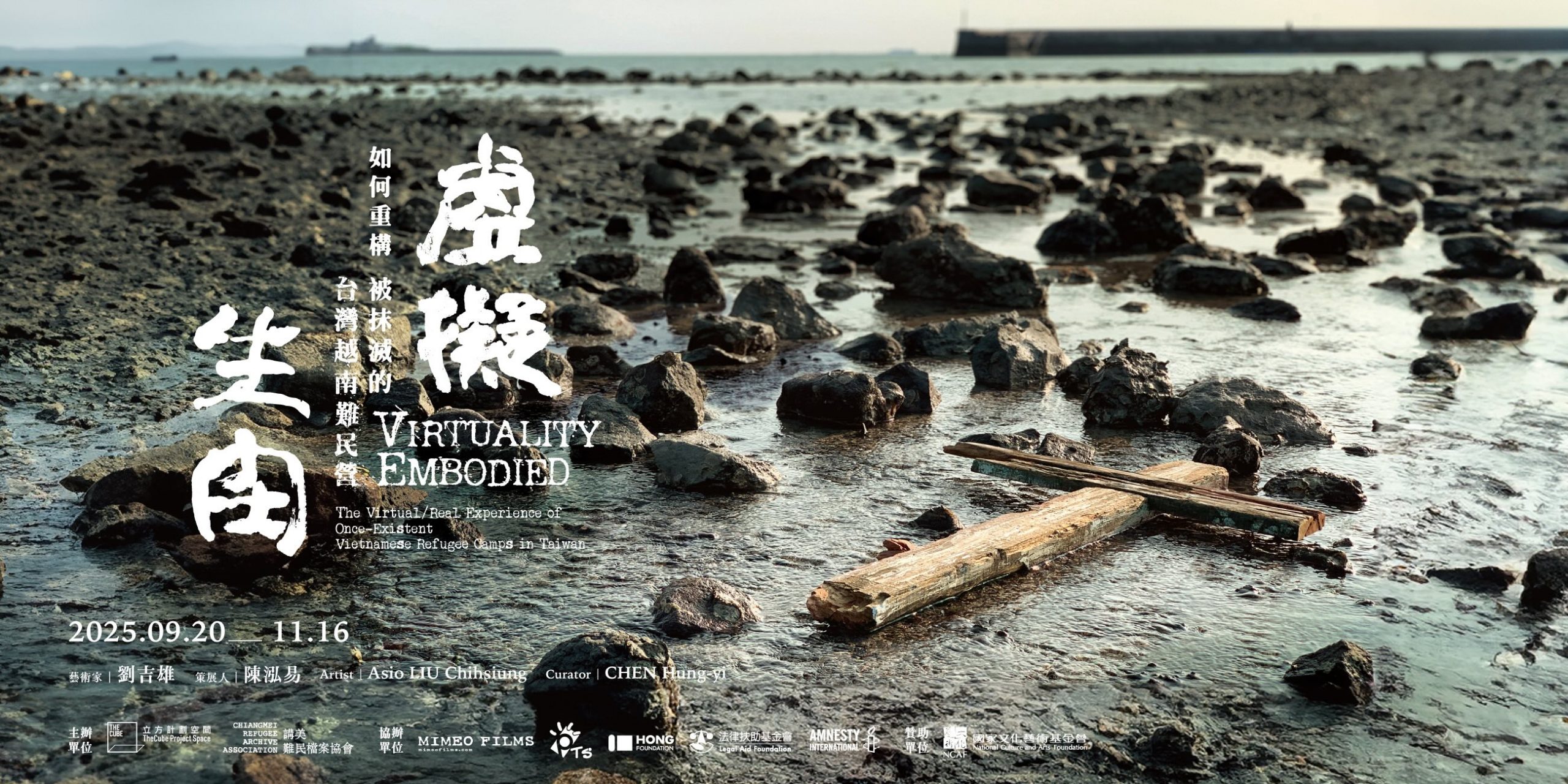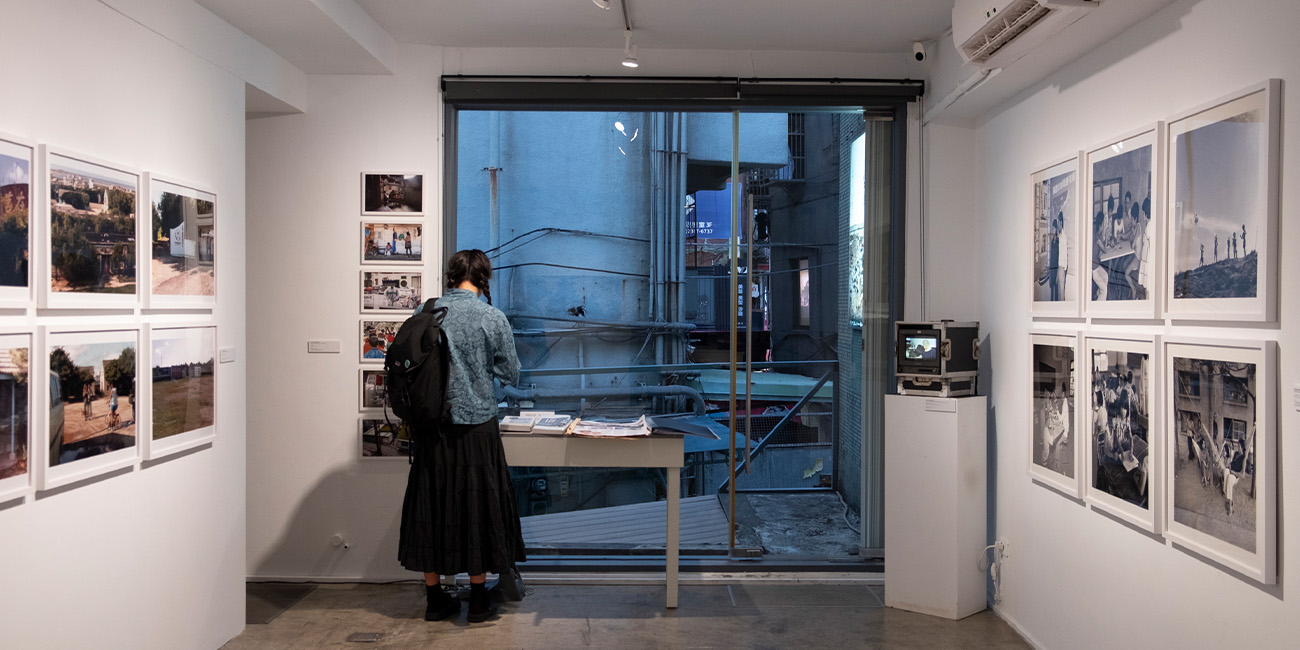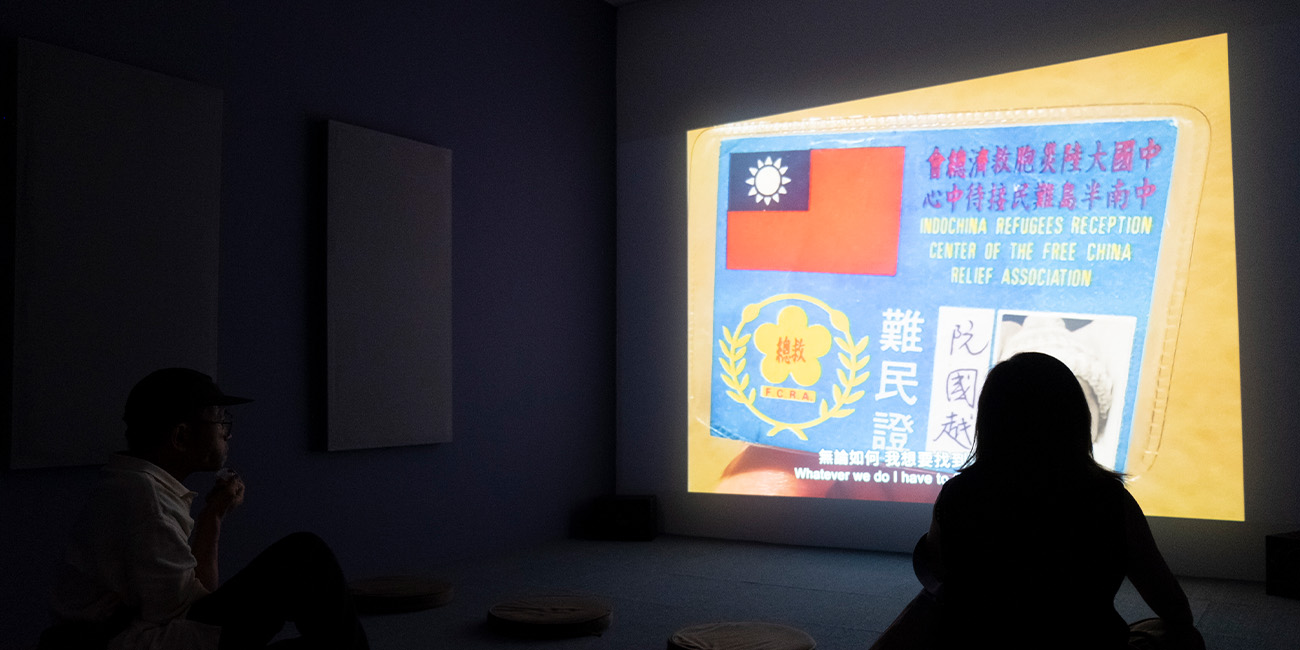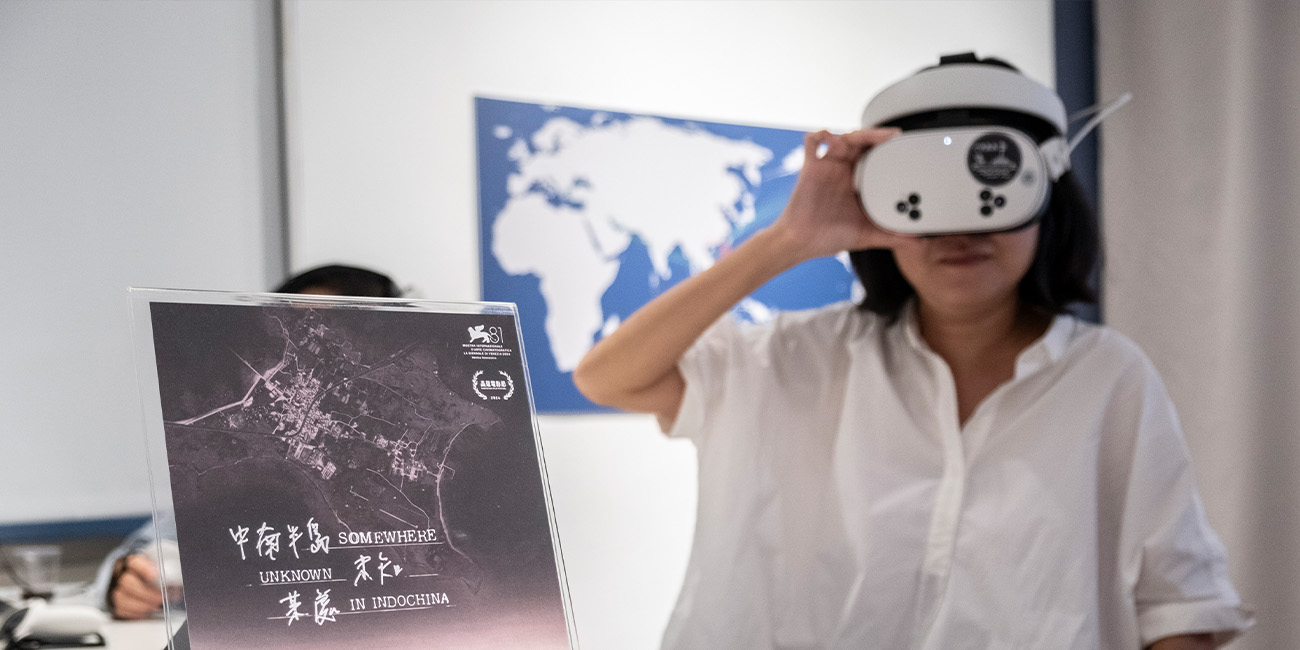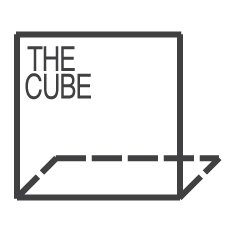TheCube Project Space is honored to collaborate with the Chiangmei Refugee Archive Association (CRAA) in presenting the Taipei edition of Virtuality Embodied from September 20, 2025. Curated by Chen Hung Yi with Asio Liu Chihsiung as the featured artist, Virtuality Embodied was previously exhibited at the Kaohsiung Museum of Fine Arts and will be presented in a more streamlined form in Taipei.
The exhibition Virtuality Embodied began with dreams that filmmaker Asio Liu Chihsiung had in 1995. He first filmed it in 2003, and after a decade of knowing nothing, he developed new works over the following years—documentaries, experimental films, VR 360 film, and even a VR museum (2012-2025). This exhibition is the first time these many versions and forms are shown together. They reflect a journey from “not knowing what we don’t know” to “knowing what we don’t know.” The works invite us to collect fragments—memories feared to be forgotten, memories feared to be remembered, things visible and invisible, drifting between the peninsula and the ocean.
The exhibition also uncovers rare works related to the Penghu refugee camps. Highlights include Love Song of the Displaced (1978), composed by South Vietnamese musician Lê Dinh (1934-2020); photographs by Canadian journalist Jules Nadeau and Vietnamese-born photographer Li Pei-Hui; and video testimony from Li Yuan-Ping, author of Tears and Blood in the South Sea (1978).
Curatorial Statement
By CHEN Hung Yi
Embodying Virtuality: The Way to Reality
Anchored in “virtuality,” this exhibition unfolds as a retrospective reflection on its many implications. Drawing on the philosophical notion of “incarnation” as a lens for thinking through bodies, Raw Meat—a literal rendering of the title—insists on the weight, flesh, and presence of abstract concepts: a gesture toward em-body-ment.
Director Asio Liu Chi-Hsiung was compelled to visit a refugee camp site in Penghu after dreaming of its impending demolition. The camp vanished before it could be thoroughly investigated or documented. Since then, a project of rebuilding, piecing together, and restoring the refugee camp lasting more than 20 years began.
Liu’s works, which combine documentary filmmaking and virtual reality building, express a poetic vision grounded in the dialectical relationship between virtuality—the refugee camp becoming a mirage after its actual existence—and the reality—the restoration of the refugee-related events and memories.
This once-existing refugee camp in Penghu, however, is not recognized by any organization outside of Taiwan, including the United Nations Refugee Agency. As a result, it has become an “incident” that officially “does not exist” in the historical record. This absence underscores a paradoxical absurdity: a real event rendered virtual due to political circumstances. The artists in this exhibition seek to actualize that virtualized reality through artistic works and digital virtual technologies.
The true historical object is not an object at all, but the unity of the one and the other, a relationship in which exist both the reality of history and the reality of historical understanding. From a hermeneutical perspective, history is not a self-contained object to be faithfully represented, but a mode of being that continues in and through texts—mediated by différance.
Taiwan is often regarded as the orphan of Asia; yet in Liu’s view, beyond orphans, we might also be refugees—those who are endlessly in defer[ral/ence].
About the Curator
CHEN Hung Yi holds a Ph.D. in Sociology from Paris Descartes University (Paris V) and is currently Associate Professor in the Department of Arts and Design at National Taipei University of Education. He also serves as the President of the Taiwan Association of Sociology of Art and Culture and Supervisor of the Taiwan Art Critics Association. Previously, he taught at Tainan National University of the Arts, where he also served as Director of International Affairs. Chen’s research and teaching focus on the sociology of art, contemporary art, and theories of contemporary craft. His curatorial and scholarly practice spans contemporary art, environmental art actions, and contemporary craft curation and interpretation. Notable exhibitions include Chiayi Tropic of Cancer Environmental Art Action (2006-2007), Temuku of the World (2015), and Post Ecolonialism Project (2015-2017).
About the Artists
Asio LIU Chihsiung is the director of MIMEO FILMS Ltd. and the founding president of the Chiangmei Refugee Archive Association (CRAA). Born in 1971 in Taipei County, he graduated from the Department of Philosophy at National Chengchi University (NCCU). He has worked as a local journalist, archaeological assistant, advertising copywriter, and bus driver. Liu’s VR work SOMEWHERE UNKNOWN IN INDOCHINA was selected for the 2024 Biennale College Cinema Immersive at the Venice Film Festival. He won Best Experimental Film at the Taipei Film Festival and directed a short film selected for the Sundance Film Festival (2001). His screenplay won the Grand Prize at the Taiwan Film Institute Excellent Screenplay Awards (2016). Since 2013, he has been filming THE PENGHU REFUGEE CAMPS TRILOGY.
LÊ Dinh (1934–2020) Renowned South Vietnamese composer, member of the trio “Lê Minh Bằng”. In 1978 he and his family of five fled Vietnam, were rescued to Kaohsiung, placed in the His-Yu (Xiyu) Refugee Camp, and later resettled in Montreal, Canada.
LI Pei-Hui (1935–2017) Vietnamese Chinese photographer from the South, once a teenage designated photographer for stars like Lin Dai and Li Lihua in Saigon. He studied at National Chengchi University (NCCU) in Taiwan and worked nearly 30 years as a press officer at the Government Information Office (GIO).
LI Yuan-Ping (1939–2019) Author of the well-known report on the refugee boat Thanh Phong, Tears and Blood in the South China Sea (1979), a 120,000-word serial published in Youth Warriors Daily. In Taiwan it was often confused with the much shorter fictional piece Blood Letter from the South China Sea (1978, Central Daily News), which was only 3,000 words in length.
Jules NADEAU (b. 1941) Veteran reporter now based in Montreal. From 1980–1986 he taught French at Fu Jen Catholic University and worked as a freelance journalist. In 1985 he visited the Penghu Chiangmai (Jiangmei) Refugee Camp and helped a Vietnamese youth emigrate to Canada.
Feng-Ting TSOU Co-director of Somewhere Unknown in Indochina VR (2024).
Awei LIU Director, co-cinematographer, and editor of the Penghu refugee camp documentary A Camp Unknown (PTS, 2023).
Jason CHANG Assistant director and drone videographer of A Camp Unknown (PTS, 2023).
WANG Pi-Cheng Still photographer for Drifters on the Border (Legal Aid Foundation, 2017).
Poster Photographer | Asio LIU Chihsiung
Prop Designer | Yi-Chu CHEN
Calligraphy | Besau Iming
Translators | Kris CHI, Shu-Chuan LIN
Title & Poster Designer | Tzu-Heng HUANG
Organizers|TheCube Project Space, Chiangmei Refugee Archive Association (CRAA)
Co-organizers|MIMEO FILMS Ltd., Taiwan Public Television Service Foundation, Legal Aid Foundation, Hong Foundation, Amnesty International Taiwan
Sponsors|National Culture and Arts Foundation
Event
Talk: Vietnamese Refugee Camps and Drifters on the Border
Date: Friday, 17 October 2025, 7:00 PM
Venue: Hong Foundation
Vietnamese Refugee Camps and Drifters on the Border is an artistic conversation that bridges history and geography. Director Asio Liu Chihsiung, who works in documentaries and VR, reconstructed the nearly erased scenes of the Penghu Vietnamese refugee camp from 1977 to 1988. He did this by using over two decades of field research and combining it with documentary film, virtual reality, and video installations. This isn’t just an act of tracing history; it’s an experiment in using art to intervene in memory, allowing the invisible history of the Penghu refugee camp to speak again.
The team from The Drifters on the Border recorded the true stories of ten stateless individuals, revealing the lives of those drifting in the gaps between borders and laws. They are part of the more than 120 million people who are currently displaced worldwide. Their situation echoes the stories from the Penghu refugee camp decades ago, reflecting the shared plight of human displacement caused by war, politics, and systemic gaps.
This dialogue not only looks back at Taiwan’s forgotten refugee history but also places this experience in an international context. As the number of refugees and stateless people continues to rise globally, how can art become a language that crosses borders, bringing overlooked memories into public discussion? The event will use video clips, readings, and in-depth dialogue to explore how artistic and published works connect drifters around the world and prompt institutional and social reflection.
Dates: 20 September – 16 November 2025, 2:00 PM – 8:00 PM, Wednesday to Sunday
Venue: TheCube Project Space
*VR screenings on Sat. & Sun. during the exhibition.
Curator: CHEN Hung Yi
Featuring Artist: Asio LIU Chihsiung
Guest Artists:
Lê Dinh (1934–2020) / Composer / South Vietnam (RVN), Canada
LI Pei-Hui (1935–2017) / Photographer / South Vietnam (RVN), ROC
LI Yuan-Ping (1939–2019) / Veteran Journalist
Jules NADEAU / Veteran Journalist / Canada
Feng-Ting TSOU / VR Director
Awei LIU / Documentary Filmmaker
Jason CHANG / Videographer
WANG Pi-Cheng / Photographer
Event
Talk: Vietnamese Refugee Camps and Drifters on the Border
Date: Friday, 17 October 2025, 7:00 PM
Venue: Hong Foundation
Register here: https://forms.gle/4hLBXxDRnQwRipHw8
Category:
Date:
2025 年 8 月 22 日

